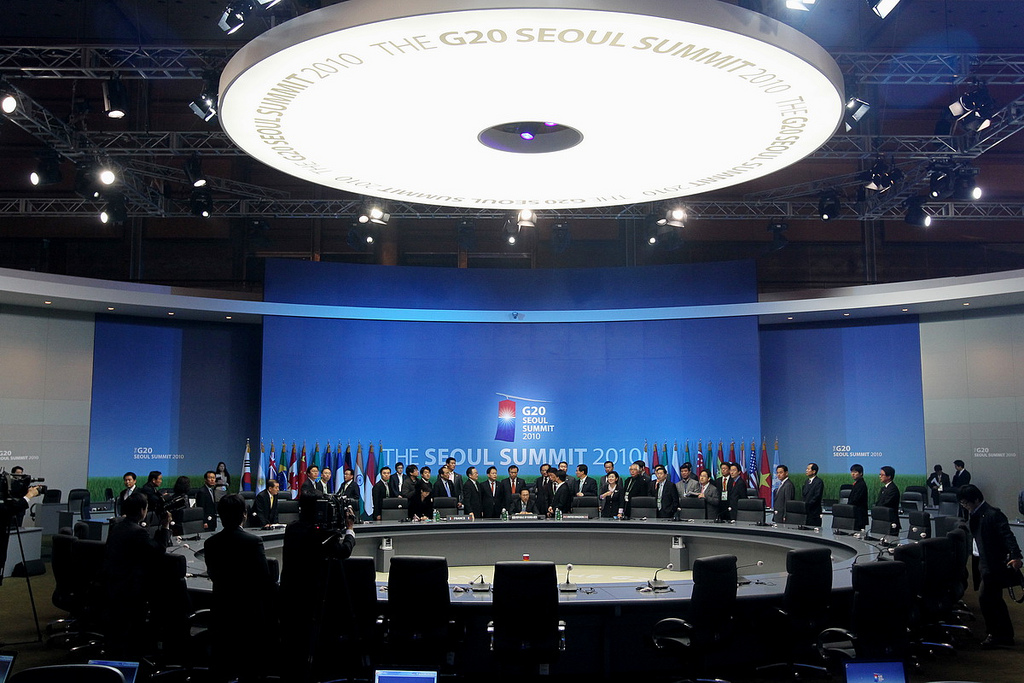The Peninsula
The Seoul G-20 One Year On

By Troy Stangarone
When scholars and historians look back on the Seoul G-20, it is likely to be seen as a brief interregnum between crises rather than the first post-crisis summit that many world leaders had hoped it would be at the time. Since the Seoul Summit last November, the world has faced growing concerns of a return to recession and a second financial crisis focused in the Euro zone area.
The Seoul Summit was a turning point for the G-20. Much of the work that had been done to address the financial crisis was formally endorsed at the Seoul Summit. World leaders adopted new capital requirements to make the financial system more robust under Basel III and endorsed work by the Financial Stability Board to address systemically important financial institutions.
Since some of the key highlights of the Seoul Summit consisted of formally endorsing ongoing work from earlier G-20 summits, the key for considering the Seoul summit’s success a year later rests with the new issues that Korea added to the agenda and how they meet ongoing global challenges. For the Seoul Summit Korea added three items to the agenda – financial safety nets, the Seoul Development Consensus, and the Business Summit.
Of Seoul’s contribution to the G-20, the push for the introduction of financial safety nets looks the most prescient should the world fall into a second financial crisis. Work on this issue led to the endorsement of enhancements to the IMF’s Flexible Credit Line (FCL), specifically the introduction of the multi-country FLC for when many countries are exposed to a common shock. Leaders also backed the introduction of a Precautionary Credit Line (PCL) at the IMF. The PCL was designed to make precautionary liquidity available to countries with sound fundamentals and policies, but moderate market vulnerabilities. The Cannes Summit saw the addition of Precautionary and Liquidity Line to further enhance the IMF’s flexibility in providing liquidity, while the issue of enhancing the global financial safety net is set to stay on the G-20 agenda as Mexico takes over the leadership in 2012.
The issue of the Seoul Development Consensus is more complex. The development agenda remained on the G-20 agenda, but took a backseat to the European sovereign debt crisis which consumed the talks in Cannes. Leaders reaffirmed their support for the Seoul Development Consensus, but also acknowledged that G-20 officials did not meet on this issue until September of this year. While the G-20 did announce some additional measures on development, the most progress seemed to be made on efforts to address food security and high volatility in food prices. To this end, the G-20 adopted the Action Plan on Food Price Volatility and Agriculture, which will address agricultural productivity and take steps to address the volatility in food prices.
The last contribution to the G-20 is the Business Summit, or B-20. The gathering of world business leaders takes place in conjunction with the G-20 summit to help provide world leaders with the prospective of business on the issues they face. While likely a worthwhile endeavor, this is perhaps the one contribution to the G-20 by Seoul that has to date shown the least progress, but also looks set to continue.
In light of the significant economic uncertainty that has taken place in Europe since the Seoul G-20, its achievements have held up quite well. In fact, if the world does experience another financial crisis in the near future, its efforts to push for financial safety nets will have made a significant contribution to the global economy. However, the area with the most promise for Seoul to leave a lasting impression on the G-20 is in the area of development. Strong, sustainable global growth is dependent upon helping the world’s developing nations meet their potential, and properly addressed the development agenda could play a significant part in this process. While the need to focus on the sovereign debt crisis is understandable, if Mexico and the G-20 pick up the development agenda to provide aid to Africa or assistance to the transitioning economies of the Arab Spring, this could be Seoul’s true G-20 legacy.
Troy Stangarone is the Senior Director of Congressional Affairs and Trade for the Korea Economic Institute. The views expressed here are his own.
Photo from Korea.net
